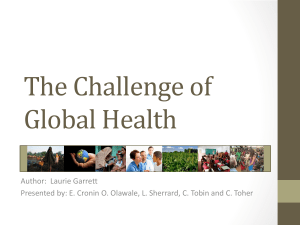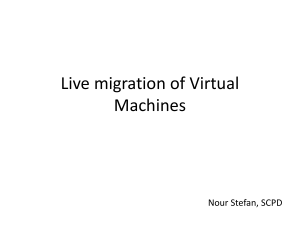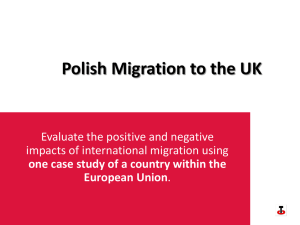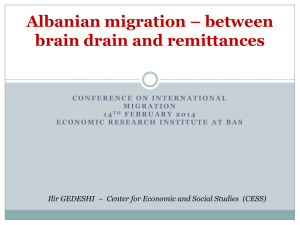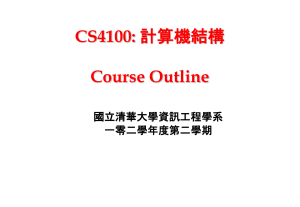PowerPoint - Emplo NET
advertisement
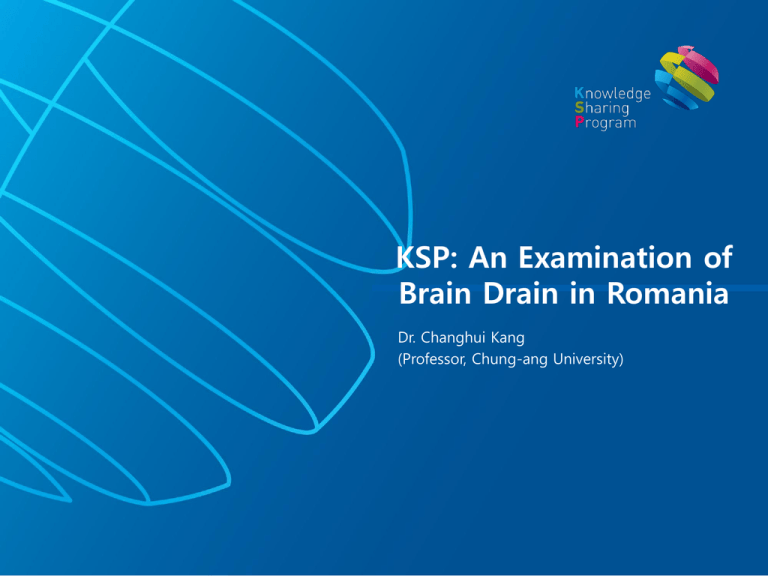
KSP: An Examination of Brain Drain in Romania Dr. Changhui Kang (Professor, Chung-ang University) Facts on Brain Drain from Romania ▶<Figure 2> Stock of Romanian Migrants 2 Facts on Brain Drain from Romania ▶<Table 1> Stock of Romanian Migrants by Destination Country/Year Italy Spain Hungary Israel United States Germany Canada Austria United Kingdom Belgium Sweden 2000 69.999 33.044 144.150 124.128 113.855 2001 82.985 68.561 145.200 120.909 140.647 2002 95.039 137.834 146.457 117.334 156.080 2003 177.812 206.395 148.535 113.754 163.759 2004 248.849 312.099 152.700 110.434 139.373 31.200 60.165 39.149 41.990 44.691 46.613 6.216 11.776 7.662 11.954 8.718 12.172 9.459 12.343 10.628 12.536 3 2005 297.570 397.270 155.364 106.942 169.113 317.000 2006 342.200 510.983 170.430 103.742 154.958 318.000 82.645 47.840 48.198 16.000 12.628 15.322 12.748 12.910 2007 625.278 706.164 196.094 100.246 169.977 209.000 2008 678.534 762.163 202.231 96.924 172.476 168.000 2009 847.533 784.834 198.229 96.385 177.035 386.000 53.415 26.000 20.374 15.214 57.567 39.000 26.154 17.352 60.456 55.000 30.641 18.532 2010 813.037 810.471 189.055 182.099 171.253 134.911 96.209 56.932 53.081 21.634 16.184 Facts on Brain Drain from Romania ▶<Figure 4> Migration of Tertiary-Edu. People: 1990 and 2000 4 Facts on Brain Drain from Romania ▶<Figure 5> Migration of Tertiary-Edu. People by Gender, 2000 5 Facts on Brain Drain from Romania ▶<Figure 6> Medical Brain Drain, 2004 14 12 10 08 06 04 02 00 6 Economic Impacts of Brain Drain ▶Negative impacts by early studies in 1970-80’s - Reduction in the absolute size of skilled labor. - Occupational shortages in certain sectors and professions (e.g., teachers, engineers, physicians, nurses). - An increase in the technological gap b/w developing and developed countries. - A loss of domestic educational investments for those high-educated and high-skilled. 7 Economic Impacts of Brain Drain ▶Important assumptions of early studies - No uncertainty regarding future migration opportunities for the educated. - A complete disconnection between emigrants and their country of origin. - Neither return migration nor remittances 8 Statistics on Return Migration ▶Return Relative to Gross Migration Flows (OECD), 1990-2000 Return/Gross 1.60 1.40 1.20 1.00 0.72 0.80 0.60 0.40 0.41 0.20 0.00 9 Economic Impacts of Brain Drain ▶Potentially positive impacts by recent studies - Migration possibility encouraging human capital formation. - Temporary migration resulting in return migration (ex. the Hsinchu Science Park of Taiwan). - Remittances. - Diaspora and network effects (ex. India’s IT sector). - Business and scientific networks and technology diffusion. 10 Empirical Evidence on Ultimate Impacts ▶Beine, Docquier and Rapoport (2001, JDE; 2007, EJ) - BDR (2001) analyze a cross-section of 37 developing countries. BDR (2007) looks into a cross-section of 127 developing countries. - A net positive impact of skilled migration prospects on gross human capital levels. - Simulation: Countries combining relatively low levels of HC and low skilled emigration rates are likely to experience a net gain. 11 Empirical Evidence on Ultimate Impacts ▶Beine, Docquier and Rapoport (2001, JDE; 2007, EJ) 12 Empirical Evidence on Ultimate Impacts ▶The optimal rate of migration displays an inverse U-shaped relationship with the source-country level of development. 13 Policy Recommendations ▶Policies promoting positive impacts of BD - Promote return migration. - Ways to increase network effects. 14 Development Status Relative to the U.S. ▶Development Status Relative to the U.S. (unit: per capita GDP, ppp) 70.0 60.0 50.0 40.0 Korea Romania 30.0 20.0 10.0 0.0 1970 1975 1980 1985 1990 15 1995 2000 2005 2010 Korea’s Experiences ▶Korea’s Policies in 1970-80s: - Various restrictions on students studying abroad through 1970s. - But, in 1981 studying abroad was liberalized. 16 Korea’s Experiences ▶<Figure 6> Number o Koreans Ph.D’s 17 Korea’s Experiences ▶Unique Features: - Various incentives were provided for those returning. Ex. The Korea Institute of Science and Technology (KIST) in 1966; The Korea Development Institute (KDI) in 1971. - Active involvement of U.S.-trained scholars in government policy makings. 18 Korea’s Experiences 19
